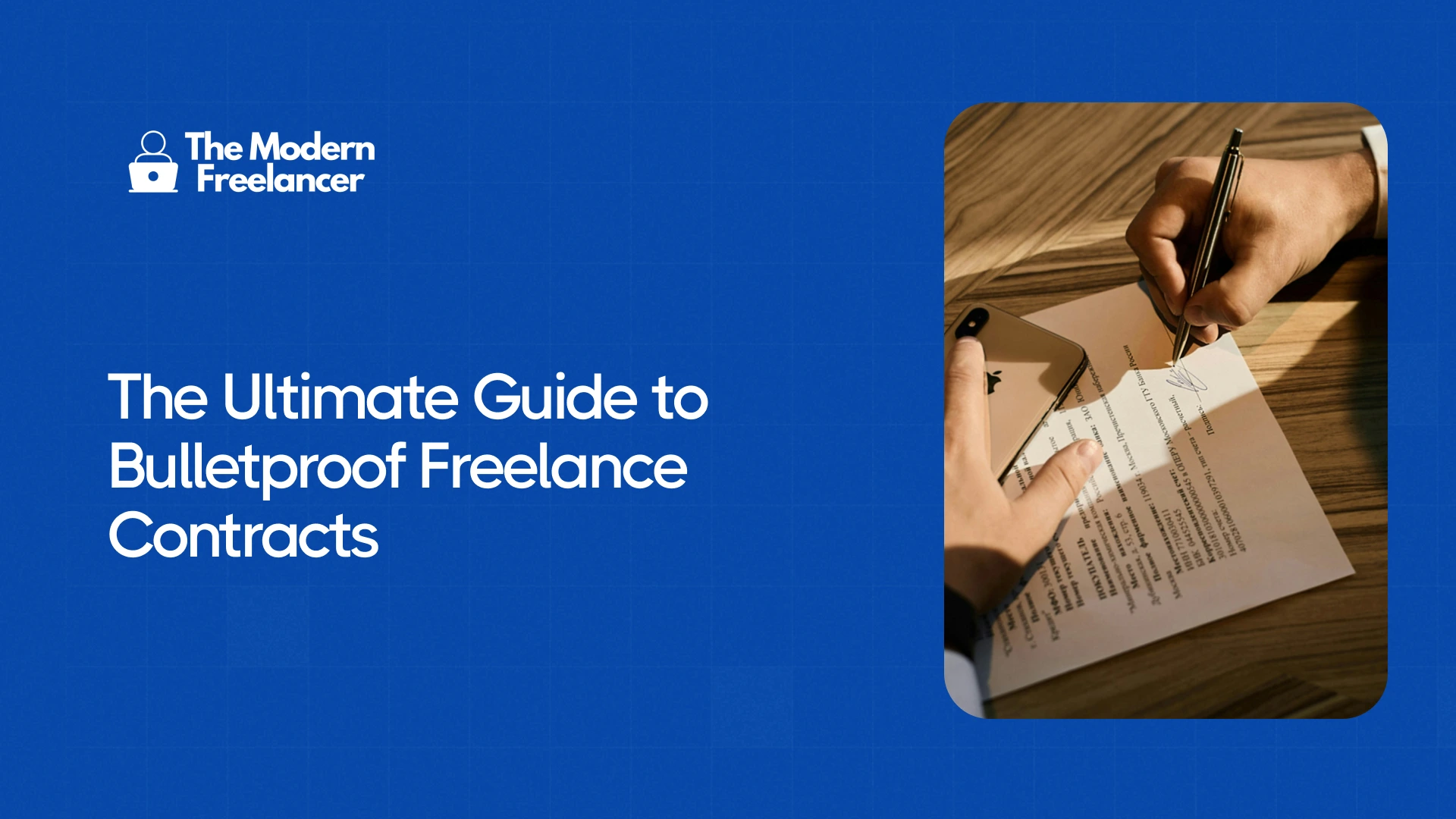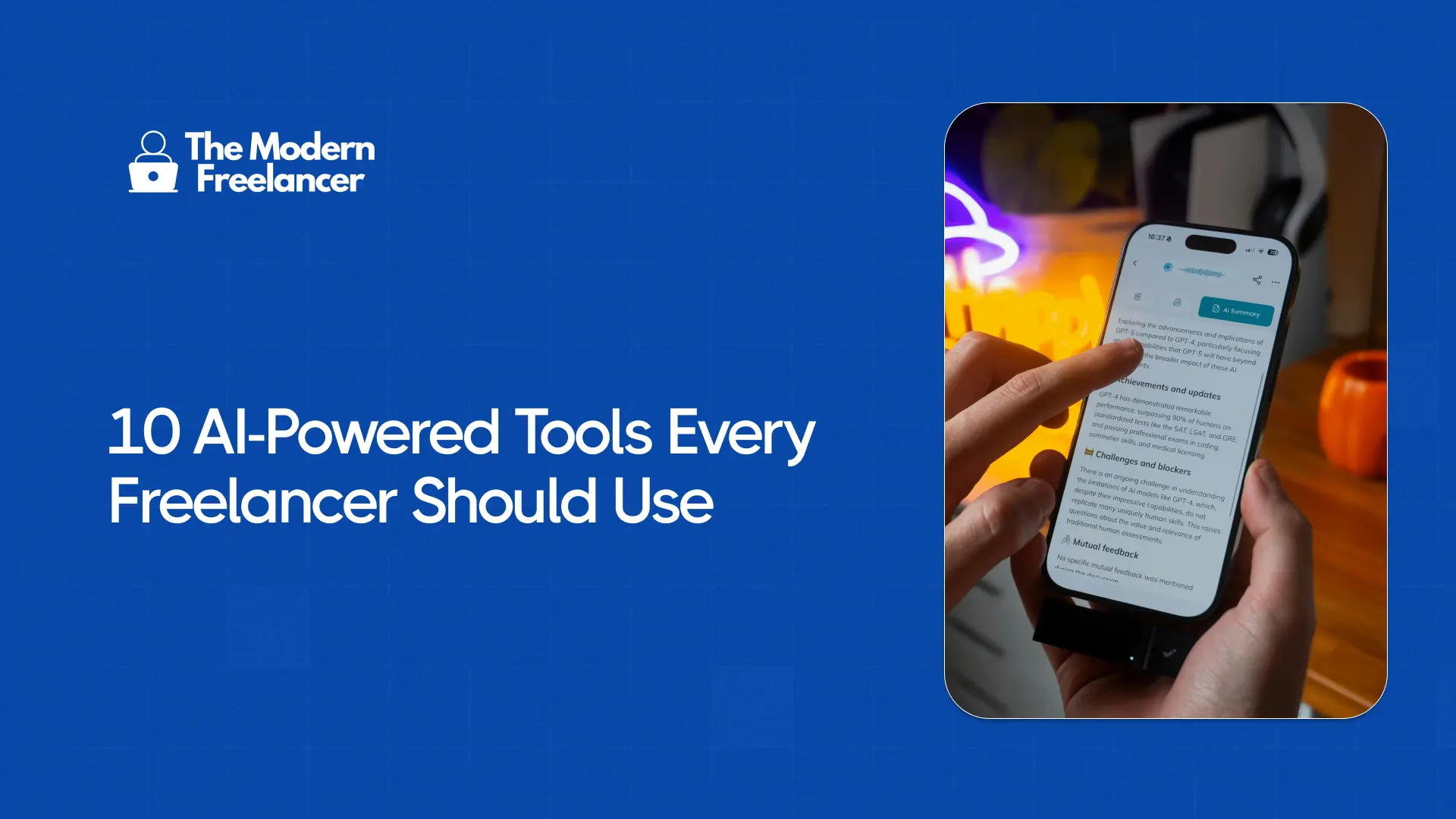The Ultimate Guide to Bulletproof Freelance Contracts
Learn how to protect yourself as a freelancer with a solid contract. Discover key clauses and tips on writing a freelance contract that works.

Heads up: Some of the links below are affiliate links, which means I may earn a small commission if you choose to use them — at no extra cost to you. I only recommend tools I personally use and trust.
Last week, a fellow freelance marketer learned a $4,000 lesson the hard way. After managing Meta ad campaigns for a month, her client refused to pay, claiming the work wasn't what they'd "verbally agreed to." With no detailed contract in place, she had little recourse beyond expensive legal action.
Sounds familiar? Maybe you’ve had your own close calls.
The Truth About Freelance Contracts
Here's what most freelancers get wrong: they either work without contracts (dangerous) or use basic templates they chatGPT'd (almost as dangerous). But a proper contract isn't just legal protection – it's a powerful tool that sets expectations, prevents scope creep, and actually helps build better client relationships.
If you're just getting started, understanding contracts is a crucial part of how to start freelancing the right way.
Let's break down exactly what you need in your contracts and why it matters.
Types of Freelance Contracts
You need to understand which type fits your situation. Here are the four main types
Project-Based Contracts
Agreements where you deliver specific work for a fixed fee. Great for defined scope projects like website redesigns or brand identity packages. You know exactly what you're earning, but income stops when the project ends.
Hourly Contracts
You bill for actual time worked. Best when the scope is unclear or might evolve. However, your income has a ceiling since you can work many hours, and clients get nervous about unpredictable costs.
Retainer Contracts
Client pays a fixed monthly fee for set hours or deliverables, like a subscription to your services. The best for most freelancers because it provides stability and helps you become a successful freelancer with consistent cash flow.
Value-Based Contracts
You price based on business value delivered, not time or tasks. The most advanced option that lets you break through income ceilings, but requires deep client conversations and proven results.
Most successful freelancers use a mix: retainers for steady clients, project-based for new ones, and value-based as they gain expertise.
The Essential Components Every Freelance Contract Needs
1. Project Scope: Your First Line of Defense
The scope section is your shield against the dreaded "could you just add this one thing?" requests. Be specific. Instead of writing "will manage your Facebook ads," spell it out:
Example clause:
Freelancer will deliver:
- 1 new campaign a week with up to 3 ad sets for audience testing
- 5 new creatives a month
- CRO audits on a quarterly basis
- Up to 10 new lines of direct-response copy a month
This level of detail might seem excessive, but it's exactly what saves you from scope creep and disputes later.
2. Payment Terms: Getting Paid On Time, Every Time
Your payment terms need to cover five key areas:
- Payment schedule (when you get paid)
- Payment methods (how you get paid)
- Late payment penalties
- Currency (especially for international clients)
- Kill fees (if the project ends early)
Example clause:
Payment Schedule:
- First month retainer due before start date
- Every month thereafter due on the first day of the next mont
- Late payments will incur a 5% fee per week overdue. All payments are non-refundable.
Pro tip: If you’re a creative, always include a clause that final deliverables remain your property until final payment is received.
3. Timeline and Milestones
Vague timelines lead to endless projects. Break your timeline into specific phases with clear deliverables and deadlines.
Example clause:
Project Timeline:
Phase 1: Discovery & Research (Weeks 1-2)
- Client questionnaire completion by [DATE]
- Strategy research presentation by [DATE]
- Taking over existing campaigns for immediate optimization
Phase 2: Execution (Weeks 3-4)
- New campaign strategy presented by [DATE]
- Launch of new creatives within 5 business days
4. Termination Clauses: Your Exit Strategy
Sometimes projects need to end early. Your contract should explain how that works.
Example clause:
"Either party may terminate this agreement with 14 days written notice. Upon termination:
- Client will pay for all work completed to date
- Freelancer will transfer all completed assets
- A kill fee of 25% of the remaining project value applies if terminated by client”
5. Intellectual Property Rights: Who Owns What
This section prevents future headaches about who can use the work and how.
Example clause:
"Upon receipt of final payment, Client will own all rights to the final deliverables. Freelancer retains the right to:
- Include the work in their portfolio
- Submit the work for awards/publications"
6. Dispute Resolution: Protecting Both Parties
This often-overlooked section becomes crucial if things go wrong. Don't wait for a dispute to figure out how you'll handle it.
Example clause:
"Any disputes arising from this agreement will be resolved through:
- Direct negotiation between parties (14-day period)
- If unresolved, through binding arbitration in [your state/jurisdiction]
- The prevailing party shall be entitled to recover reasonable attorney fees
This agreement is governed by the laws of [your state/country]. Any legal proceedings shall take place in [your city, state]."
For international clients, consider adding:
"All disputes will be resolved through the International Chamber of Commerce's arbitration procedures, conducted in English."
Pro tip: If you work with international clients regularly, consider adding a clause specifying which country's laws will govern the contract. This prevents confusion and potential conflicts of law issues later.
7. Signatures and Execution
While this might seem obvious, the signature section needs specific elements to be legally sound.
Example clause:
"By signing below, both parties acknowledge that they have read, understood, and agree to all terms and conditions outlined in this agreement. This agreement becomes effective on the date of the last signature below.
For the Client:
Name: _________________
Title: __________________
Date: __________________
Signature: ______________
For the Freelancer:
Name: _________________
Title: __________________
Date: __________________
Signature: ______________
For digital signatures, add:
"The parties agree that electronic signatures shall be valid and binding as original signatures for all purposes of this agreement."
How To Write a Freelance Contract
You don't need to be a lawyer to create a solid freelance contract. Start with a template, customize it for your project, and you're done in 15-20 minutes.
- Use a template as your starting point
- Customize the scope section for the specific project
- Set your payment terms (I always require 50% upfront for new clients)
- Add timeline with specific dates
- Include termination and dispute resolution clauses
- Set up signature fields
Send it through DocuSign, PandaDoc, or HelloSign (never as a Word doc). E-signature tools look professional, get faster signatures, and store everything for you.
Tools to Help Make Freelance Contract Creation Easier
Don't waste time manually creating contracts. The right tools save hours and make you look professional. My top picks:
- PandaDoc (my personal favorite): Proposals, contracts, and e-signatures in one. The $19/month tier is worth it if you're sending multiple contracts monthly.
- Bonsai: Built for freelancers with contract templates, invoicing, time tracking, and tax help. At $24/month, it's your complete business hub.
- HelloSign/Dropbox Sign: Solid free tier (3 documents/month) for freelancers just starting out.
- HoneyBook: Great for creative freelancers, gorgeous templates, but $39/month.
Budget recommendations:
- Just starting? Google Docs + HelloSign free tier. Simple and effective.
- Making $3K-5K/month? Upgrade to Bonsai or PandaDoc. The time savings justify the cost.
- Booking $5K+ projects? Full PandaDoc or HoneyBook. Your process should match your pricing.
The tool matters less than using it. Pick one, set up templates, and send a contract before every project. No exceptions.
How to Protect Yourself as a Freelancer
Your client sent over their freelance contract? Never sign without reading it carefully. Their contract protects them, not you.
You can and should negotiate. I've pushed back on terms dozens of times and never lost a client over it. Professionals expect negotiation. Watch for these dangerous clauses:
Unlimited Revisions
Never agree to this. Specify something like "three rounds of revisions included, additional rounds billed at $X per hour."
Work for Hire
You give up all rights, including portfolio use. If they demand this, negotiate to at least retain portfolio rights or charge significantly more.
Non-Compete
Can devastate your business if too broad. If they insist, narrow it to specific competitors and a reasonable timeframe (6 months max). Better yet, charge extra for exclusivity.
Indemnification
Standard indemnification for your work is fine. Red flag: clauses making you liable for things beyond your control, like their product failures or false marketing claims.
Bad Payment Terms
Net 60/90 is a hard no unless it's corporate standard (even then, get 50% upfront). Never accept "payment upon client's receipt of payment from their customer". You're not a bank.
Auto-Renewal
For retainers, ensure there's a clear exit clause like "either party may terminate with 30 days notice."
My review process:
- Read it completely
- Highlight anything uncomfortable
- Research legal terms I don't understand
- Draft proposed changes
- Send back: "Thanks for the contract. I've reviewed it and have a few requested changes to better align with how I work. Can we discuss?"
Most clients will negotiate. The ones who won't are red flags. If you're seeing warning signs, check out my guide on how to deal with difficult clients.
For complicated contracts or $10K+ projects, spend $200-300 to have a lawyer review it. I once paid $250 and they caught a freelance contract clause that would've cost me $8K. Remember: you're a business, not an employee. Protect yourself like one.
4 Common Contract Disputes and Prevention
- Scope creep is perhaps the most frequent battleground in freelance projects, where clients continuously request "small additions" that balloon into significant extra work. The best defense is a meticulously detailed scope section that lists every deliverable, specifically outlining what is and isn't included in the project. Consider including examples of what constitutes additional billable work.
- Payment delays can cripple a freelance business, often stemming from unclear terms or lack of enforcement mechanisms. Combat this by implementing clear payment schedules with specific due dates, late payment penalties, and a clause retaining ownership of all work until final payment is received. Consider adding milestone payments for longer projects to maintain consistent cash flow.
- Timeline issues arise when project phases stretch beyond their intended duration, usually due to delayed client feedback or unclear deadlines. Prevent this by creating a detailed timeline with specific milestones, clearly outlining both your deliverables and client responsibilities. Include provisions for how delays in client feedback affect the overall project timeline.
- Revision disputes often emerge when clients expect unlimited changes or there's disagreement about what constitutes a revision. Head this off by explicitly defining the number of revision rounds included, what qualifies as a revision versus a new concept, and the cost for additional revisions beyond the included amount. Include examples of what counts as a single revision versus multiple revisions.
Remember: A contract isn't just about protecting yourself legally – it's about creating clarity and setting the foundation for successful client relationships. When both parties know exactly what to expect, you're free to focus on doing your best work.
Your Action Step
Create your own contract template or grab a free copy of my proposal contract I’ve used to close clients for years.



